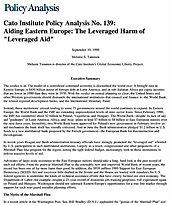Instead, those institutions’ annual lending to some 75 governments around the world continues to expand. In Eastern Europe, the World Bank and the IMF are extending unprecedented levels of state-sector loans. Since February 1990, the IMF has committed about $2 billion to Poland, Yugoslavia, and Hungary. The World Bank–despite its lack of any aid “graduates” in Latin America, Africa, and Asia–plans to lend $7 billion to $8 billion to East European nations over the next three years. Incredibly, two World Bank loans approved for Poland’s new government in February involve an aid mechanism the bank itself has roundly criticized. And in June the Bush administration pledged $1.2 billion in U.S. funds to a new multilateral bank proposed by the French government–the European Bank for Reconstruction and Development.
In recent years Reagan and Bush administration treasury officials have strongly promoted the “leveraged aid” afforded by U.S. participation in such multilateral institutions. Largely as a result, congressional and other proponents of a Marshall Plan-like program for the region, noting the tight federal budget, increasingly look to those institutions to deliver massive levels of aid.
Advocates of large-scale assistance to the East European nations should take a long, hard look at the past record of such aid efforts. From the postwar Marshall Plan to the ostensibly new and improved World Bank of recent years, the record has been one of far more harm than good. In addition, the $938 million 1989 Support for East European Democracy (SEED) Act and successor bills drafted in the Senate and the House are loaded with mandates for U.S. federal agencies to undertake the kinds of technical assistance efforts that have clearly harmed our own economy. The Department of Labor, for example, despite a 25-year record of disastrous job-training programs, will experiment again on Poland and Hungary. Washington should not sidetrack Eastern Europe’s opportunities for a true free market through support for such rear-guard socialist planning efforts.

